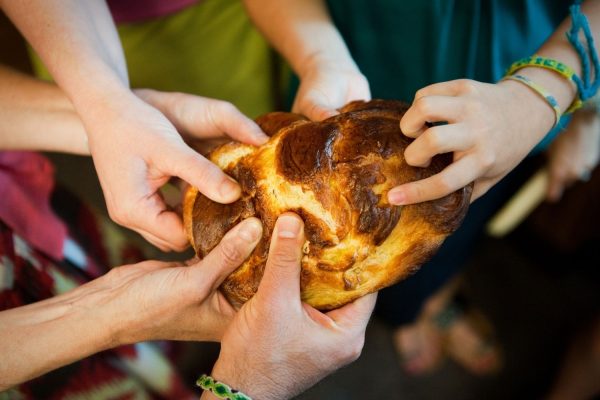In the Garden of the Shekhinah
This meditation is based on the following teaching:
There is a midrash that teaches that when God split the sea, fruit trees (apple and pomegranate) bloomed in the miraculous passage through the waters, and birds perched in the trees sang to celebrate the freedom of the former slaves (Exodus Rabbah 21:10, Hammer, p. 177). The Zohar imagines the Shekhinah as an apple orchard (Hammer, p. 179). Another midrash relates the story of Serach bat Asher, granddaughter of Ya’acov Avinu and Leah Imeynu. With her gift of music, Serach was able to re-unite her grandfather with his son Yoseph. Because of this, Serach was granted an exceptionally long life and, over 200 years later, she was one of those who went out of Egypt (Midrash Derech Eretz Zuta I, Judaism 101). Birds have special meaning in many spiritual traditions, including Judaism. From another spiritual tradition, it is said: “Only birds sing the music of heaven in this world” (Robayashi Issa, Japan, trans. by Robert Hass). The Torah makes reference to doves, ravens, and eagles. In Mishnaic Hebrew, the word Shekhinah refers to birds’ nesting and the Shekhinah, the indwelling presence of God, is said to manifest in the world as a bird (Hammer, p. 177). In Kabbalistic Judaism, the ten sefirot, or spiritual qualities of the Tree of Life, are referred to as ten gates (Labowitz, p. 22).
MEDITATION
Imagine you are walking along the shoreline of a body of water. You see a vast expanse of blue sky above the water. You feel the warm sun upon your skin. You feel a gentle breeze as it brushes your cheek. You note the ebb and flow of the water. First one wave, then another, gently caresses the shore. See and feel the water mingling with the warm, white sand beneath your feet.
As you walk along the shore, a woman of light approaches you. In her hands she holds a cage with a bird inside. She opens the cage door, releasing the bird. Opening its wings into full wingspan—the bird flies gracefully above the waters. The woman says: “Leave the cage that contains and constricts you. Be free like the bird.”
As the bird flies over the waters, you see the waters separate, revealing a miraculous passage. In this passage, between the vertical walls of water, a beautiful garden appears—a garden filled with trees and flowers. You note how beautiful the trees are. Some are laden with apples and pomegranates. Others are crowned with blossoms. You note the rich variety and beauty of the flowers.
Now envision yourself entering into this passage. You step into the garden and follow the flight of the bird. The garden contains ten gates. As you pass through each one, you hear sweet, soothing melodies sung by birds nesting in the trees.
You pass through the tenth gate and find yourself in a new place, a place that transcends time and space. In this place, you are free of anything that constricts you. As you enter into this place, you hear the sound of the most beautiful music. You see Serach, grand-daughter of Ya’acov Avinu and Leah Imeynu, playing her harp. You see Miriam and the women of Exodus—dancing and singing the Song of the Sea. Now see yourself joining them—dancing and singing the Song of Freedom—dancing and singing the Song of your Soul.
Know that you are always free to enter into this sacred Garden of the Shekhinah, into this place of freedom. These places are always there for you—deep within you. Know that Serach, Miriam, and the women of Exodus are always there for you—singing and dancing with your soul.
The Parting of the Sea: Portal into Another Dimension
This meditation is based on a midrash that says that the opening in the Sea of Reeds at the time of the Exodus was a portal into another dimension beyond that of the physical reality we know.
MEDITATION
Imagine that it is the time of the Exodus out of Egypt. See yourself walking with all the people as you approach the Sea of Reeds. Envision the waters parting to reveal a passage. Envision the Shekhinah leading you into this passage. As you enter the passage, you note the walls of glistening water on either side of you. Then you experience something you have never experienced before as you are transported to another dimension, a dimension beyond the time and space that you know. You see galaxies swirling all around you. And, among these galaxies, is one that is in the shape of the DNA molecule within our cells. You no longer feel the physical presence of your body. You feel the DNA of your cells merge with the light of the DNA galaxy as you are transformed into pure light energy. You feel yourself becoming one with the stars that God created, as it is written: “He numbers the stars and calls them each by name” (Psalm 147:4, Tanakh).
Notes
Hammer, Jill (2006). The Jewish Book of Days. Philadelphia: JPS.
JPS. (1999). Tanakh. Philadelphia: JPS.
Judaism 101.
Labowitz, Shoni. (1996). Miraculous Living. New York: Simon & Shuster.










